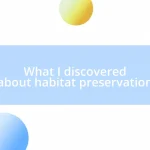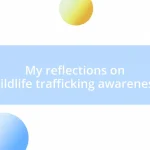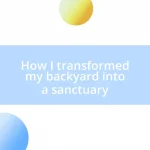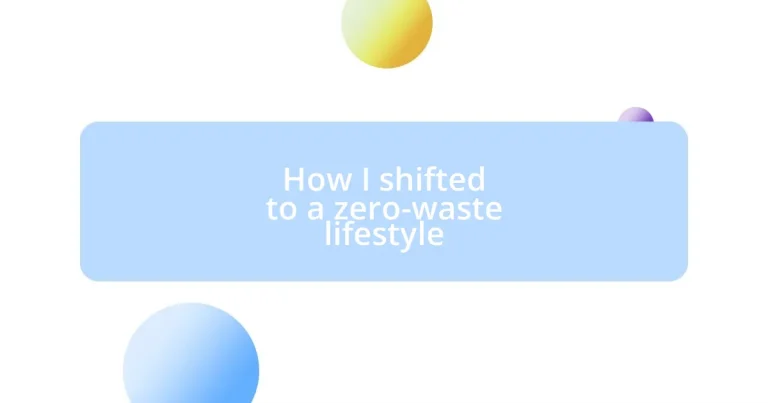Key takeaways:
- Adopting a zero-waste lifestyle requires a mindset shift that prioritizes sustainability over convenience, with practices like refusing single-use plastics and composting.
- Conducting a waste audit and tracking habits help identify areas for reduction, leading to more conscious choices such as bulk shopping and using reusable containers.
- Setting realistic goals, celebrating small victories, and staying flexible are essential for maintaining motivation in the transition to zero waste.
- Sharing the journey with others and building community connections enhances the experience and encourages collective mindfulness towards waste reduction.
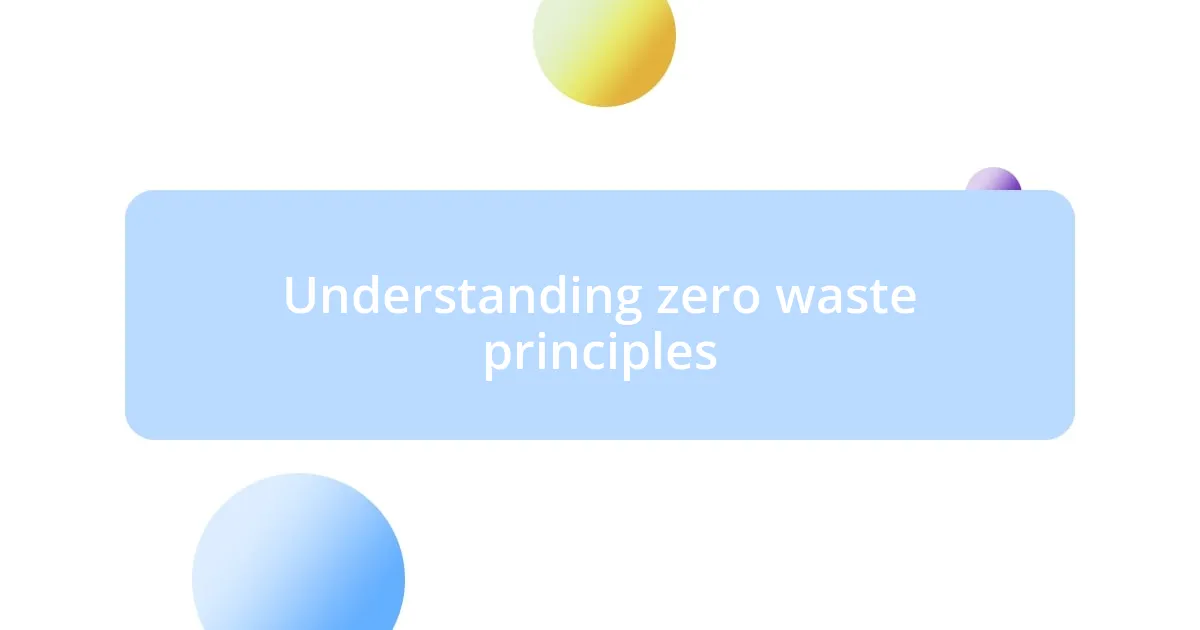
Understanding zero waste principles
Understanding the principles of a zero-waste lifestyle fundamentally reshapes the way we interact with the world around us. For me, it began with a simple realization: my daily choices were contributing to a never-ending cycle of waste. Have you ever stopped to think about how much packaging you throw away each week? It was eye-opening to see that the decisions I made—like opting for convenience over sustainability—had a direct impact on the environment.
At the core of zero waste is the mantra: refuse, reduce, reuse, recycle, and rot. I remember when I first tried to refuse single-use plastics—those tiny changes felt monumental. It’s easy to feel overwhelmed, especially when faced with the enormity of the waste crisis. But what if every small step we took led to a ripple effect of positivity? Encountering challenges, like forgetting my reusable bag, was frustrating at first, but each stumble taught me resilience and creativity in finding alternatives.
I truly believe that adopting zero waste principles requires a shift in mindset, one that values sustainability over convenience. Reflecting on my journey, I often ask myself, “What legacy do I want to leave?” It’s more than just about minimizing garbage—it’s about fostering a deep, emotional connection to the planet and recognizing the power of individual actions. Every choice we make is an opportunity to embrace a more mindful existence, and that’s something profoundly beautiful to strive for.
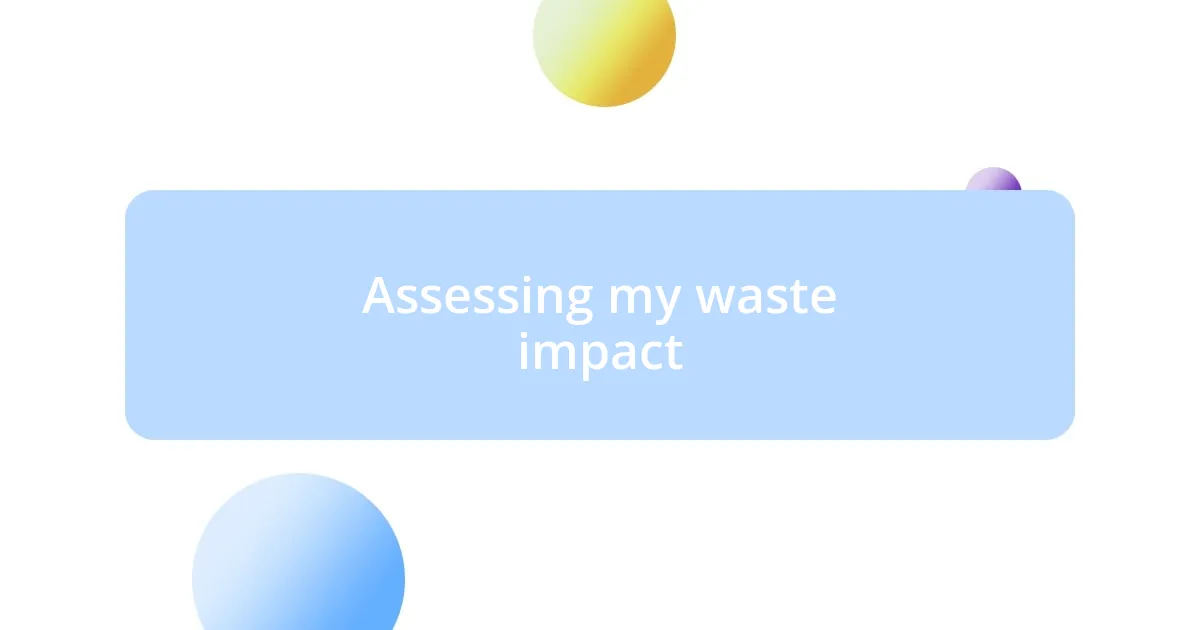
Assessing my waste impact
Assessing my waste impact required some serious reflection on my personal habits. I started by keeping a waste diary to track everything I tossed in the trash for a week. The results were staggering; I was shockingly unaware of how much food packaging and single-use items were piling up. Have you ever taken an honest look at what you throw away? It was a big wake-up call for me, revealing habits I needed to change.
What struck me the most was the sheer volume of organic waste I generated—mostly fruits and vegetable scraps that I could have easily composted. I found myself reminiscing about the blissful days of taking those veggie peels straight to my small compost bin in the backyard. Seeing that transformation from waste to nutrient-rich soil was thrilling! It made me realize how much I could potentially reduce my waste and contribute positively to the environment.
I began to compare my current habits with alternatives. By switching to bulk bin shopping and saying no to excess packaging, I felt like I was regaining control. My waste impact didn’t just decline; it became a source of pride. Each time I left the store with a refillable container instead of plastic bags, it became a testament to my commitment. This journey has not only helped me minimize my waste but also encouraged others around me to reflect on their habits.
| Waste Type | Impact Before Zero Waste |
|---|---|
| Plastic Packaging | Over 20 items/week |
| Food Waste | 3-5 pounds/week |
| Reusable Items | 1-2 items/week |
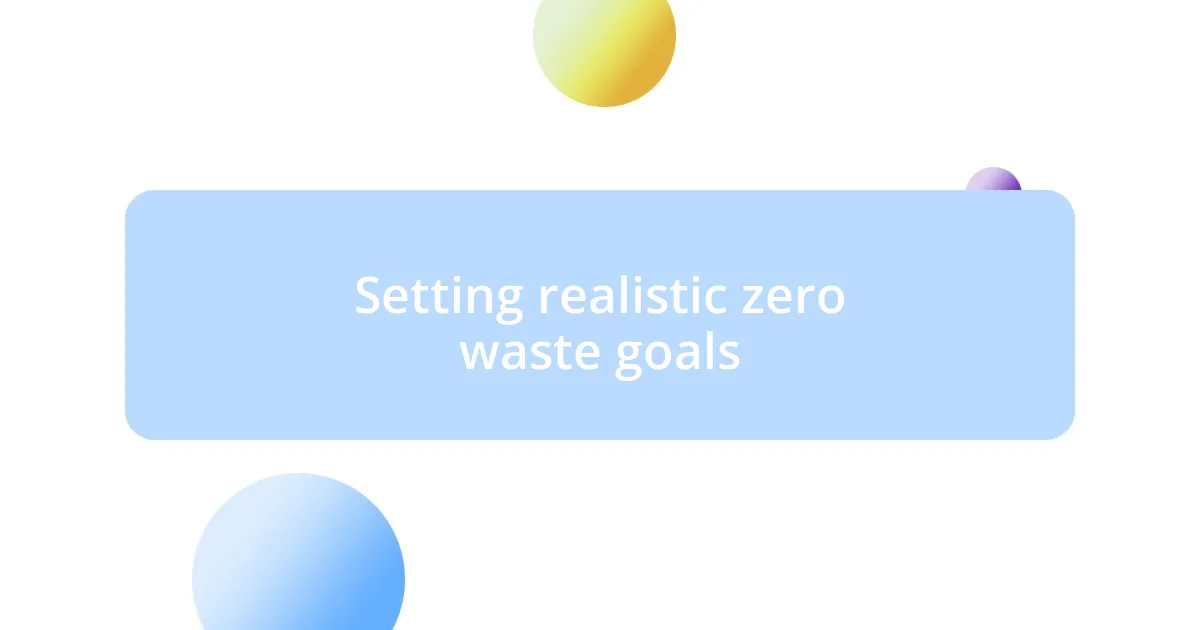
Setting realistic zero waste goals
Setting realistic zero waste goals is a crucial step in making meaningful changes without feeling overwhelmed. I often tell friends that starting small was the key for me. My first goal was to eliminate plastic bags from my grocery trips. It may sound minor, but that one change felt liberating! Each week, I’d pack my reusable bags with care, a simple act that filled me with pride. Over time, I began to set more ambitious goals, like composting and reducing my food waste. These aspirations were reflective of my growing commitment to the zero waste lifestyle.
To help you set your own realistic zero waste goals, consider these tips:
- Start with a week-long waste audit: Track what you throw away to identify common culprits.
- Focus on one area at a time: Choose a specific aspect of your life—like shopping—before tackling others.
- Set measurable goals: Instead of vague intents, aim for a specific reduction percentage, like “reduce plastic wrap use by 50%.”
- Celebrate small victories: Each step counts. Acknowledge your progress, like successfully finding a zero-waste alternative.
- Stay flexible: Life happens. If you slip up, remember it’s part of the journey and adjust your goals accordingly.
It’s empowering to see the changes manifest over time, and what began as a few small efforts evolved into a lifestyle I cherish deeply. Even now, I find joy in setting new goals—every time I see a new way to refuse waste, it feels like a personal triumph.
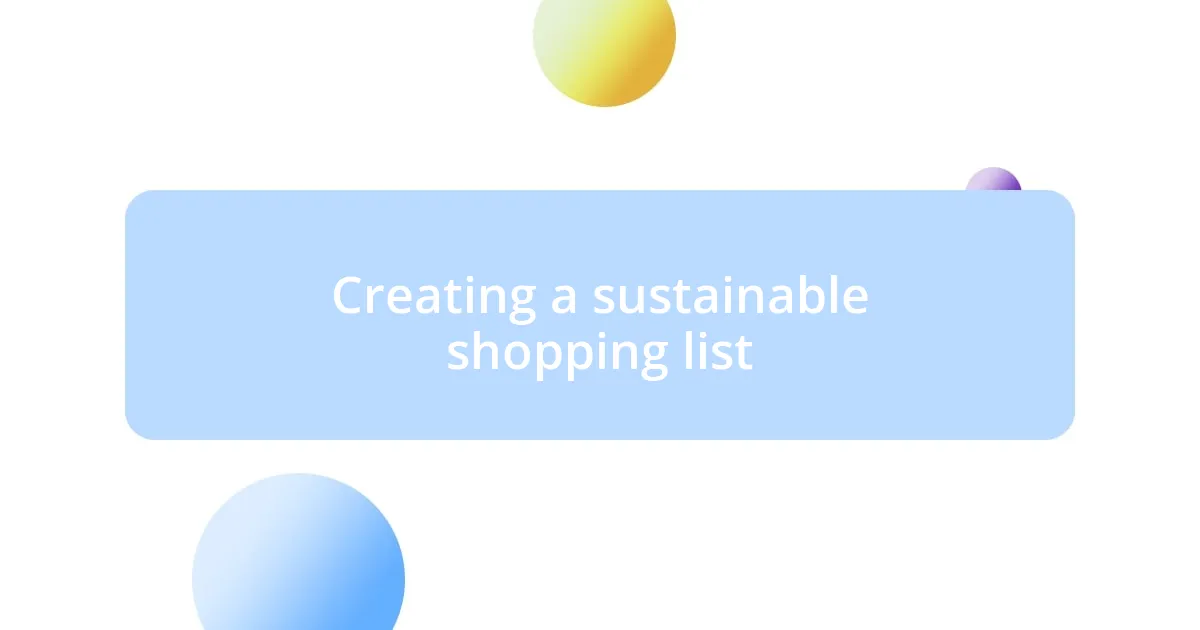
Creating a sustainable shopping list
Creating a sustainable shopping list starts with a clear understanding of your needs and wants. I often stand in my kitchen and assess what items I genuinely use versus what I’ve mindlessly bought in the past. Have you ever considered the things that end up in your pantry but never see the light of day? By identifying staple foods that I love and regularly prepare, I’ve been able to cut down on impulse purchases and reduce waste effectively.
When crafting my list, I lean heavily on local, seasonal produce. I remember a particular Saturday morning when I visited the farmer’s market and was overjoyed to chat with growers about their organic practices. It’s not just about snagging fresh veggies; it’s about fostering connections with those who cultivate our food. This direct relationship allows me to better understand what’s in season, ensuring I buy only what I can realistically consume.
Lastly, I make it a habit to always bring my reusable bags and containers, which has become second nature. Each trip to the store now feels less like a chore and more like a purposeful outing. The small satisfaction I feel when I decline single-use plastic is palpable—have you ever felt that little rush of accomplishment? It’s these moments of mindfulness that truly reflect the commitment to a sustainable lifestyle, making me proud to share this journey with others.
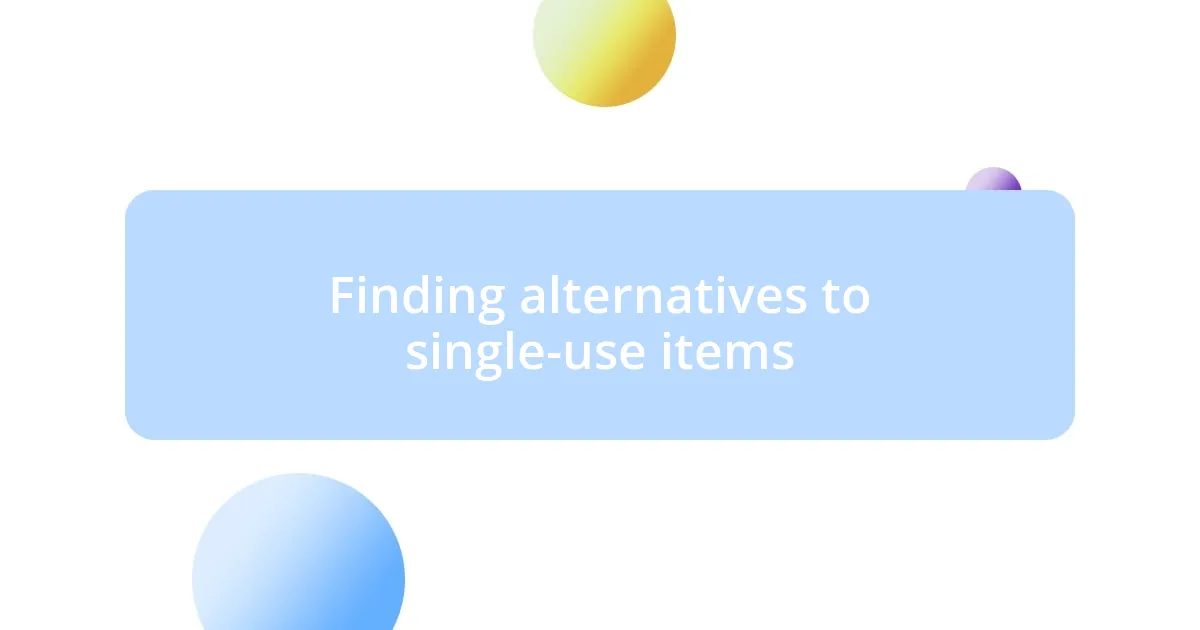
Finding alternatives to single-use items
Finding alternatives to single-use items can initially feel overwhelming, but I realized that simplicity is key. For instance, instead of reaching for disposable coffee cups, I now carry my trusty stainless steel travel mug everywhere. I remember the first time I walked into my favorite café with it; the barista smiled, and there was a little spark of connection. It’s funny how one small choice can turn every cup of coffee into an act of caring—for myself, my wallet, and the planet.
I also swapped out plastic straws for reusable ones, and let me tell you, choosing a vibrant, colorful silicone straw felt like such a fun upgrade! This was more than just a practical switch: it became a conversation starter whenever I had friends over. “Have you tried these yet?” I’d ask while handing one over, and suddenly, discussions about sustainable living flowed effortlessly. It’s incredible how these simple changes can create ripple effects, sparking greater awareness in those around us.
Moreover, I found joy in exploring DIY solutions as alternatives for everyday items. I started making my own beeswax wraps to replace plastic wrap, and honestly, it was like a mini science project! The first time I peeled off a fresh wrap to cover leftovers, I felt a burst of satisfaction—like I had unlocked a new skill that benefited both my kitchen and the environment. Have you ever had that moment when a homemade creation just feels right? Each step towards a zero-waste lifestyle may be small, but collectively, they’re anything but insignificant.
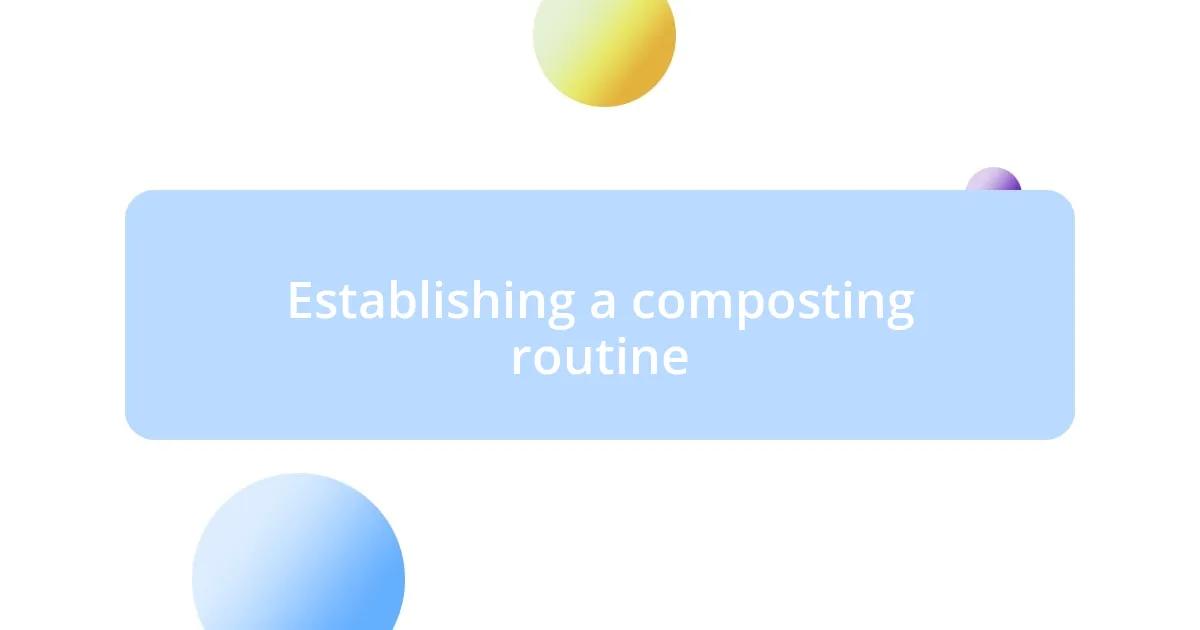
Establishing a composting routine
Establishing a composting routine was, at first, daunting, but I discovered it’s all about starting small. I began with a simple container on my kitchen counter for fruit peels and coffee grounds. It was satisfying to watch it fill up, knowing I was keeping waste out of the landfill.
As I got more into it, I invested in a compact compost bin for my backyard. One weekend, while I layered brown materials like dried leaves with green scraps, I felt like I was creating something valuable. It was surprisingly therapeutic, almost like gardening. Have you ever experienced that sense of accomplishment when you turn waste into something productive? It made composting not just a chore, but a rewarding part of my weekend routine.
To keep everything organized, I now maintain a compost calendar on my fridge, tracking what I add each month. This simple tool reminds me to balance my scraps properly and ensures my compost stays healthy. Plus, every time I turn the compost, I feel like I’m nurturing a little ecosystem. Isn’t it fascinating how something as ordinary as kitchen waste can transform into rich soil? It’s a beautiful cycle that reminds me of the earth’s resilience.
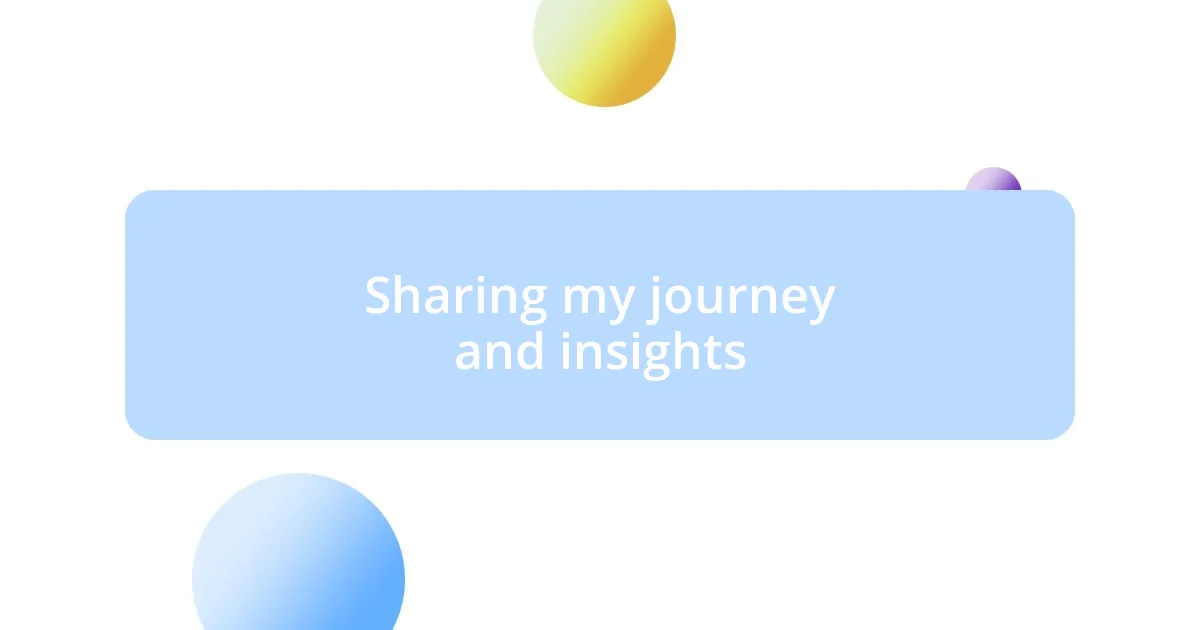
Sharing my journey and insights
When I think back on my journey towards a zero-waste lifestyle, I can’t help but smile at how surprising the whole experience has been. I vividly remember my first visit to the bulk food store—I was both excited and a little nervous. The sight of those jars and bins filled with grains, nuts, and spices was like stepping into an adventure! I felt empowered as I filled my reusable bags, but there was also a pang of anxiety: would I remember which jars to fill? That moment taught me to embrace imperfection; it’s all part of the learning curve.
As I adapted to these changes, I started noticing the emotional weight of my choices. Every time I reused a jar for storing leftovers or dusted off my cloth shopping bags instead of opting for plastic, I felt a sense of pride. Have you had that moment when you realize you’re contributing to something bigger than yourself? I found that embracing this lifestyle not only reduced my waste but also rejuvenated my connection to the community, as I often shared tips and tricks with friends who expressed curiosity about my journey.
I’ve learned to celebrate the small victories, like discovering a new local vendor that prioritizes sustainable practices. One day, I walked into a small shop selling handmade soaps wrapped in paper instead of plastic. As I picked one up, I knew I was supporting something meaningful. It’s these little moments of joy and connection that keep me motivated. How rewarding is it to know that each conscious choice, no matter how small, contributes to a healthier world? My journey remains a continuous exploration, full of insights and surprises, and I can’t wait to see where it leads next.

